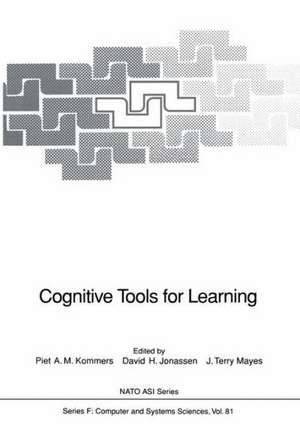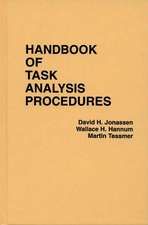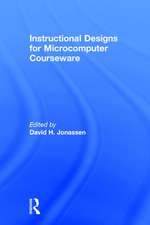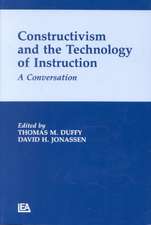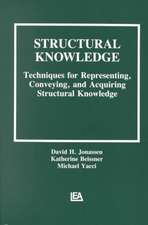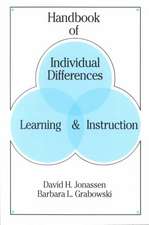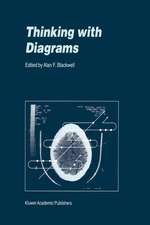Cognitive Tools for Learning: NATO ASI Subseries F:, cartea 81
A. Ferreira Editat de Piet A.M. Kommers, David H. Jonassen, J. Terry Mayesen Limba Engleză Paperback – 8 dec 2011
Din seria NATO ASI Subseries F:
- 20%
 Preț: 650.27 lei
Preț: 650.27 lei - 20%
 Preț: 668.55 lei
Preț: 668.55 lei - 20%
 Preț: 992.44 lei
Preț: 992.44 lei - 18%
 Preț: 1239.19 lei
Preț: 1239.19 lei - 20%
 Preț: 1922.81 lei
Preț: 1922.81 lei - 20%
 Preț: 654.37 lei
Preț: 654.37 lei - 18%
 Preț: 1234.00 lei
Preț: 1234.00 lei - 20%
 Preț: 709.78 lei
Preț: 709.78 lei - 20%
 Preț: 656.03 lei
Preț: 656.03 lei - 18%
 Preț: 1854.94 lei
Preț: 1854.94 lei - 20%
 Preț: 374.97 lei
Preț: 374.97 lei - 20%
 Preț: 991.94 lei
Preț: 991.94 lei - 20%
 Preț: 671.02 lei
Preț: 671.02 lei - 20%
 Preț: 1925.96 lei
Preț: 1925.96 lei - 20%
 Preț: 994.73 lei
Preț: 994.73 lei -
 Preț: 389.49 lei
Preț: 389.49 lei - 20%
 Preț: 657.99 lei
Preț: 657.99 lei - 20%
 Preț: 655.20 lei
Preț: 655.20 lei - 18%
 Preț: 1225.31 lei
Preț: 1225.31 lei - 18%
 Preț: 952.09 lei
Preț: 952.09 lei - 20%
 Preț: 332.06 lei
Preț: 332.06 lei - 20%
 Preț: 1284.47 lei
Preț: 1284.47 lei - 20%
 Preț: 644.81 lei
Preț: 644.81 lei -
 Preț: 395.85 lei
Preț: 395.85 lei - 18%
 Preț: 1221.07 lei
Preț: 1221.07 lei - 15%
 Preț: 643.34 lei
Preț: 643.34 lei - 20%
 Preț: 645.47 lei
Preț: 645.47 lei - 20%
 Preț: 1282.98 lei
Preț: 1282.98 lei - 20%
 Preț: 656.36 lei
Preț: 656.36 lei - 20%
 Preț: 1283.31 lei
Preț: 1283.31 lei - 20%
 Preț: 1924.15 lei
Preț: 1924.15 lei - 20%
 Preț: 362.24 lei
Preț: 362.24 lei
Preț: 648.11 lei
Preț vechi: 810.14 lei
-20% Nou
Puncte Express: 972
Preț estimativ în valută:
124.01€ • 129.95$ • 102.52£
124.01€ • 129.95$ • 102.52£
Carte tipărită la comandă
Livrare economică 11-25 aprilie
Preluare comenzi: 021 569.72.76
Specificații
ISBN-13: 9783642772245
ISBN-10: 3642772242
Pagini: 296
Ilustrații: X, 282 p.
Dimensiuni: 170 x 242 x 16 mm
Greutate: 0.49 kg
Ediția:Softcover reprint of the original 1st ed. 1992
Editura: Springer Berlin, Heidelberg
Colecția Springer
Seria NATO ASI Subseries F:
Locul publicării:Berlin, Heidelberg, Germany
ISBN-10: 3642772242
Pagini: 296
Ilustrații: X, 282 p.
Dimensiuni: 170 x 242 x 16 mm
Greutate: 0.49 kg
Ediția:Softcover reprint of the original 1st ed. 1992
Editura: Springer Berlin, Heidelberg
Colecția Springer
Seria NATO ASI Subseries F:
Locul publicării:Berlin, Heidelberg, Germany
Public țintă
ResearchCuprins
1. What are Cognitive Tools?.- 2. Cognitive Tools: A Suitable Case for Learning.- I Semantic Networking as Cognitive Tools.- 3. Constructing Knowledge with Learning Tool.- 4. TextVision and the Visualisation of Knowledge: School-based Evaluation of its Acceptance at two Levels of Schooling.- 5. SemNet: A Tool for Personal Knowledge Construction.- 6. Cognitive Tools: The Experience of CASP, NoteCards, SemNet.- 7. Flexibility of Expressiveness: A Critical Factor in the Design of Concept Mapping Tools for Learning.- II Expert Systems as Cognitive Tools.- 8. Building Knowledge Bases: An Environment for Making Cognitive Connections.- 9. Levels of Processing in Building Expert Systems.- 10. Computers and Exploratory Learning in the Real World.- III Hypertext as Cognitive Tools.- 11. Tailoring Hypertext for the Learner.- 12. Heuristics for Cognitive Tools.- 13. Gloves for the Mind.- IV Collaborative Communication Tools.- 14. Using Timbuktu™ and Guide™ for Computer Supported Group Learning.- 15. Gossip as a Collaborative Communication Tool.- V Microworlds: Content Dependent Cognitive Tools.- 16. Learning Elementary Mathematics: A Discussion of Microworlds.- 17. How to Put Language in a Child’s Mind: The Development of “Scriptor” as a Computer Tool for Writing.- 18. Structure of Learning Environments and Individual Differences as Predictors of Learning.- 19. Learning Environments for Cognitive Apprenticeship: From Experience to Expertise.- VI Implementing Cognitive Tools.- 20. Consequences of Moving from a Traditional Cybernetic Approach to a Open Exploratory Learning Environment.- Addresses and Biographies of Lecturers.
